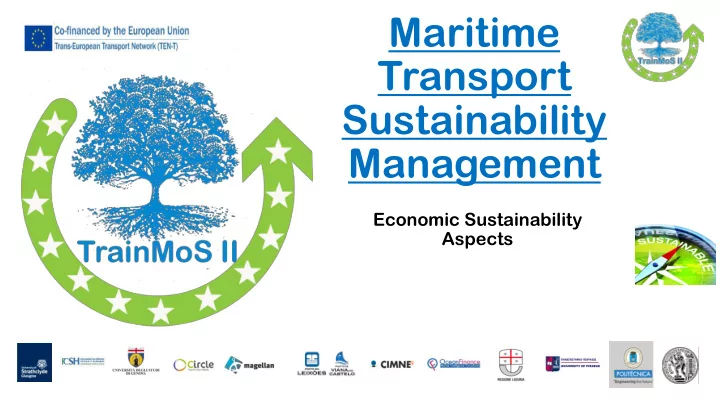

Maritime Transport Sustainability Management Economic Sustainability Aspects
Levers of change for sustainability • Economic Sustainability Aspects
Shipping Markets • Freight market - agreements for the use of ship and derivative contracts - FFA • New construction market - purchase & sale of new ships • Buying and selling market - purchase & sale of used ships • Shipbreaking market - last sale of the ship • Economic Sustainability Aspects
Global container operators Ow Owned ned and and char arter tered ed ships ps Conce ncentr ntration tion of of the e oper eration tion 15,3% Own Fleet Charters 0,16 13,1% 0,14 1800000 1600000 0,12 Number of TEUS 1400000 0,1 9% 1200000 1000000 0,08 800000 0,06 5,1% 5% 600000 4,3% 400000 0,04 3,7% 3,3% 200000 3,2% 3,1% 3% 0,02 2,9% 0 2,5% 2,4% APM-Maersk 2,1%2%1,9% Mediterranean Shg Co CMA CGM Group Evergreen Line 0 Hapag-Lloyd COSCO Container L. 1,9% CSCL Hanjin Shipping MOL Yang Ming Marine Transport… 1,7% Hamburg Süd Group OOCL APL NYK Line 1,1% UASC K Line PIL (Pacific Int. Line) Hyundai M.M. Zim Wan Hai Lines • Economic Sustainability Aspects SHIP OWNERr Share of world liner fleet
Movement of goods by sea: extracted from “ Maritime Economics ” Martin Stoppford 3rd Edition • Economic Sustainability Aspects
Financial flows End or • Owner-charterer (freight 1) intermediate consumers • Shipper-charterer (freight Shipperr 2) • Consumer/manufacturer Charterer (purchase/sale) • Cycle inversion for Ship Owner manufacturing • Economic Sustainability Aspects
Finantial Flows Company B • Economic Sustainability Aspects
Definitions • Shipper • Charterer • Voyage, time and bareboat charter party • FFA – forward freight agreement • Broker • Construction shipyard • Shipbreaking site • Economic Sustainability Aspects
Ships: dimensions and typologies Commer mercial cial dimensions ensions Constr struct uction ion dimension ension • Cape size • Length • Panamax/new panamax • Draught • Supramax • Breadth • Handysize • Air draft • Handymax • Displacement • Suezmax • Deadweight • Economic Sustainability Aspects • Lightship displacement
Limitations to ship dimensions Suez Su z Canal al – Su Suezmax zmax maxi ximum um Panamá amá Canal nal - Panamax amax sectional tional area ea 1006 06 m 2 • Economic Sustainability Aspects
Maritime transport indicators • Baltic Dry Index (BDI) - Weighted index with contract values for capesize, panamax, supramax and handysize • There are separate indexes for each type of ship • BCTI and BDTI – tanks • BDI max 11793 in 20/05/2008 • BDI in 05/12/2008 = 663 • Economic Sustainability Aspects
World fleet of bulk carriers • Japan, Greece, Germany, China and Norway control 50% of the fleet • Bulk fleet structure is highly fragmented (2100 companies control 9000 ships) • Fleet adaptation involves the entrance/exit of • Economic Sustainability Aspects participants
Maritime transport indicators BDI I Evolution ution: : source stock charts • Economic Sustainability Aspects
Drivers of the freight market • Number of ships available by type, number of ships available for delivery, number of ships being dismantled • Demand for raw materials: levels of industrial production, agricultural production, fuel consumption, ore, etc. • Seasonal variations • Bunker prices • Choke points • Market sentiment • Economic Sustainability Aspects
• Economic Sustainability Aspects
Shareholder performance of the freight market Perfor ormance mance of of conta tainer iner shipow powner ers Performance ormance of of bulk shipowner owners • Economic Sustainability Aspects
Used ships market Reasons for sale: • Adjust the mix and capacity (route*type) of each ship • Market expectations • Obsolescence and fleet renewal • Financial engineering • Economic Sustainability Aspects
Used ships market Reasons for buying 2nd hand: • Answer to a sudden increase in demand • Entry opportunity in a new market • Market expectations • Economic Sustainability Aspects
Used ships market in 2012 • Economic Sustainability Aspects
New ships market Purchase of new ships: • The need for ships not available in the used market • Ships for specific projects (e.g. drilling vessels) • Investment • Economic Sustainability Aspects
New ships market Purchase contract: • Price Global LNG Ship Orders Piling Up in Shipbuilding News 14/05/2015 • Ship specifications Ship owners around the world are placing orders for new vessels one after another. • Contract terms and Not a few of them are expected to go to Korean shipbuilders. conditions • Financing • Economic Sustainability Aspects
Containership fleet adaptability • Economic Sustainability Aspects
Construction of new ships in 2014 25000 22.682 22.455 20000 Orders in thousand gt 15000 13.421 10000 5000 1.878 0 600 China 519 South Korea 375 Japan 326 Philippines 312 Taiwan Germany 293 Vietnam 212 Romania data Italy U.S. Brazil Source: IHS; Shipbuilders' Association of Japan Note: Source: IHS; Shipbuilders' Association of Japan
Shipbreaking market (scrapping) Shipbreaking market: • Valorisation in function of light displacement • Price per ton rather volatile • Retrofitting unfeasible • Scraping due to regulation (phase out) • Economic Sustainability Aspects
Scrapping market • Economic Sustainability Aspects
Port Interface • Infraestructures: ports and • Small scale local ports canals • Big scale local ports • Port authority • Regional ports • Port operador • Regional distribution • Port terminal centers (hubs) • Challenges due to the • Transhipment ports change in fleet profile • Economic Sustainability Aspects
Major world ports in container handling 40 35,28 33,9 35 30 Moviment in milions of TEUs 25 24,03 22,3 20 19,45 18,65 16,62 15 16,16 15,24 14,05 10 12,3 10,94 5 10,59 10,59 0 1,23 0,67 • Economic Sustainability Aspects 2014
Recommend
More recommend